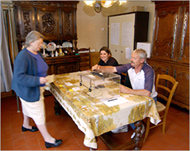France rejects EU constitution
French voters have massively rejected the EU’s first ever constitution, dealing a rude slap in the face to their governing elite, and a potentially fatal setback to the continent’s ambitious plans for deeper political union.

In a national referendum on Sunday, they voted by about 55% to 45% to turn down the constitution, according to three exit counts released as polls closed at 10pm (2000 GMT).
The “No” win had been predicted, but the huge margin of the victory deepened a sense of crisis across the EU.
Turnout was also very high, at between 70-80%, reflecting the intensity of the national debate.
“This is an ordeal, a real disappointment,” said Foreign Minister Michel Barnier, while Defence Minister Michele Alliot-Marie called it “a defeat for France and a defeat for Europe”.
Ignoring pleas from President Jacques Chirac that rejection would make France the “black sheep” of the 25-member bloc, the public was instead swayed by fears that the treaty would destroy the country’s welfare system, leach new powers to Brussels and shift jobs to low-cost economies of eastern Europe.
EU uncertainty
The result opened a period of deep uncertainty inside the EU, because the constitution needs to be ratified by all members.
By creating the posts of EU president and foreign minister and streamlining the complex process of decision-making, the treaty’s 448 articles are intended to build European muscle at a time of intensifying global competition.
|
“This is an ordeal, a real disappointment” Michel Barnier, |
So far, nine countries have approved the constitution and the rest aim to continue the procedure up to a deadline of October 2006; but it is unclear how the text can survive, now that it has been rejected by one of the EU’s six founder members and half of the vital Franco-German axis.
European leaders fear the French “No” could have a domino effect on other countries planning to hold referendums – first of all the Netherlands, which has a non-binding national vote on Wednesday.
Britain has hinted it might scrap a planned referendum if France voted down the constitution.
Sunday’s result was a crushing blow to Chirac, who put his authority on the line with three televised appeals for a “Yes” vote – warning that rejection would marginalise France’s voice in Europe and do nothing to safeguard its generous social model.
Government reshuffle?
The 72-year-old president – who marked 10 years in office earlier this month – was expected to ignore calls for his resignation, instead ordering a prompt reshuffle of his government with the dismissal of Prime Minister Jean-Pierre Raffarin.
Hotly tipped to replace him is Interior Minister Dominique de Villepin, 51, who made his name as the suave spokesman for French opposition to the US war in Iraq.
 |
|
The French public rejected the |
Other names mentioned are Alliot-Marie and Chirac’s arch-rival Nicolas Sarkozy, head of the ruling Union for a Popular Movement (UMP) party.
The rejection marked further evidence of the chronic rift separating the French public from the Paris-based political establishment, nearly all of which – on left and right – lined up in support of the constitution.
Chirac’s Union for a Popular Movement was joined by the centrist Union for French Democracy (UDF) and the opposition Socialists and Greens in calling for a “Yes” vote – meaning that parties holding 96% of seats in the National Assembly were disavowed by the public.
The “No” vote was urged by a disparate array of forces, including the far-right of Jean-Marie Le Pen, nationalist Eurosceptics, Communists and Trotskyists, dissident Socialists under former prime minister Laurent Fabius, and anti-globalisation groups.
Passionate debate
Two months of campaigning triggered one of the most passionate political debates of recent years, with both sides sensing that the referendum was a moment to define France’s future course.
Families and friends were polarised as the country split down the middle between pros and antis.
 |
|
Jacques Chirac is likely to be |
While supporters argued that the constitution was a necessary next step towards France’s destiny as the leader of a united Europe, rejectionists said it was a charter for unbridled capitalism and would entrench US-style “liberal” economics at the heart of the EU.
Many ordinary voters caught the message that the constitution would open up France to cheap competition from eastern Europe and lead to “dumping” as norms of social protection are dragged downwards.
Some also saw a “No” vote as a way of blocking Turkish entry to the EU, even though the issue is not in the text.
Despite Chirac’s urging in a televised appeal on Thursday “not to answer the wrong question,” it is also clear that many voters used the referendum to punish his government – which they blame for 10.2% unemployment, falling real wages and a crisis of confidence in the country’s future.